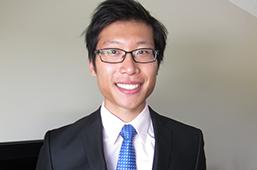
Jake Yeung is a graduate student in the Genome Science and Technology program at UBC and is working under the supervision of Dr. Colin Collins at the Vancouver Prostate Centre. Jake completed his undergraduate training in Chemical Engineering at the University of Waterloo. Currently, his research work involves computational discovery of trans-acting factors that regulate alternative splicing in neuroendocrine prostate cancer. His general research interests include computational biology and modeling of biological systems. Jake is the award recipient of the 2013 VCH Research Institute Sidhoo Trainee Travel Award.
What is your area of interest? And what led you to this?
My interest is in computational biology and modeling of biological processes. Though my undergraduate training is in engineering, I always found the way cells regulate themselves and coordinate numerous pathways and feedback loops together extraordinary. Engineers have been able to model a number of processes, from cars to nuclear power plants. However, we have not yet been able to model biological processes. The parts to a cell are numerous and their functions are unclear, let alone their dynamic interactions. This challenge has led me to pursue my graduate studies in the Genome Science and Technology program at UBC. I think being able to integrate and model the intricate layers of gene regulation would hold promise for real-world applications, such as therapeutic strategies against cancer.
What has been the proudest moment in your career?
My proudest moment was winning the Walmart Green Student Challenge in 2012 with my wonderful teammates, Arthur Yip and Alan Thai. We were very fortunate to have the opportunity to pitch in front of the CEOs of Walmart Canada, Coca Cola Canada and others alike.
If you could be any superhero, which would you be and why?
I would be Iron Man, because he is able to verbally instruct a computer to automate all of his work for him. It would save me so much time if I could tell a computer to do what I want, rather than coding it explicitly.
If you could invite any three people (living or dead) to dinner, who would they be and why?
Richard Feynman, Bruce Lee, Bill Gates.
Richard Feynman seems to have an abundance of anecdotes to share. I think he would be fascinated to hear about how the world operates today, with the expansion of social media and technologies.
There are so many stories about Bruce Lee that it becomes difficult to separate the legend from the person. I think hearing Bruce speaks his mind would be enlightening.
I would love to hear firsthand on the work Bill Gates is planning to do in developing communities. I think he is helping to solve many neglected but vital problems in the world. Also, I am sure he would be so impressed that I was able to bring along the likes of Richard Feynman and Bruce Lee to dinner that he would keep in touch with me for future contact.
Do you see yourself continuing the work and loving what you do in 20 years?
I have not been in the field of genome informatics for very long, but reading the literature I can see how fast the field is expanding. It is unclear what the future will be like in 20 years, but as long as there are intellectually stimulating challenges to tackle in this field, I will continue to love what I do.
What is your healthiest habit?
I listen to language learning podcasts every day. Listening to them 20-30 minutes every day has been surprisingly effective. These last few years, I have used it to learn French and Mandarin with decent success, which has helped me greatly during my travel. I am learning German now!


